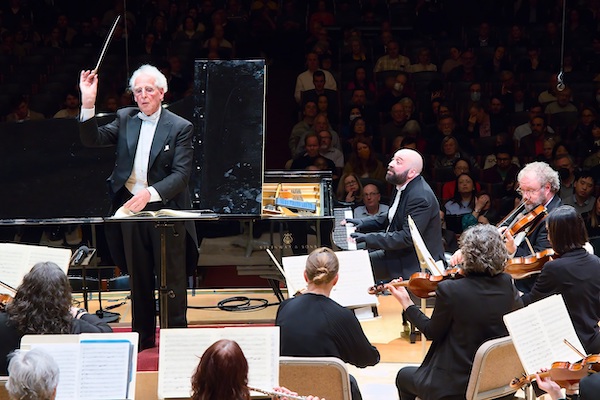Concert Review: Boston Philharmonic Orchestra plays Mozart and Bruckner
By Jonathan Blumhofer
Ultimately, on some level, the Boston Philharmonic Orchestra’s performance of Bruckner Ninth functioned as a study in approaching the unknown (and unknowable) with humility.

Benjamin Zander conducting pianist Alessandro Deljavan and the Boston Philharmonic Orchestra in a performance of Mozart’s Piano Concerto No. 24. Photo: Hilary Scott
Epics needn’t be gigantic. And artistic Everests aren’t necessarily as imposing or impenetrable as they might initially appear.
At least that was the situation Friday night at Symphony Hall when the Boston Philharmonic Orchestra (BPO) and Benjamin Zander wrapped their 45th season with the pairing of Mozart’s Piano Concerto No. 24 and Bruckner’s Symphony No. 9. Though strikingly different in form, structure, range of dynamics, and forces required, each selection furrows related expressive terrain.
The Mozart, which dates from 1786, is among his most turbulent and melancholy creations. Musically, its sober atmosphere is established from the start, with a snapping, chromatic orchestral introduction.
On Friday, the BPO etched this section tautly. That made the contrast with pianist Alessandro Deljavan’s initial entrance – dreamy, lyrical, poetic – all the stronger. Making his first return to Boston since his local debut with the Philharmonic in 2019, the Italian keyboardist offered an account of the solo part that was unfailingly eloquent and beautifully voiced.
It was also grippingly focused. The first movement was flowing and shapely. There and in the Larghetto, with its pure, singing refrains, and in the finale’s dappled chiaroscuro, Deljavan imbued his playing with radiant warmth and a remarkable depth of tone.
For much of the reading, too, his performance seemed to occupy a serene place separate from the expressive uneasiness kicked up by the orchestra. And yet, throughout the night, Deljavan and the Philharmonic matched their articulations beautifully. Indeed, the rapport between pianist and orchestra in the slow movement was enchanting. The spot in the finale’s coda where soloist and ensemble poignantly join their themes together felt genuinely tragic.
Zander led the BPO in an accompaniment that was robust and boldly voiced. Occasionally, balances were an issue, Deljavan’s instrument never quite dominating the musical fabric as it might. But so nuanced were his and the orchestra’s phrasings and so clearly simpatico his partnership with the conductor, that there was never a question of the rightness of the night’s interpretation. Here’s an artist, one realized, who ought to be a regular presence in Boston’s concert life.
As if to emphasize the point, Deljavan provided a distinguished, expansive encore in the form of Schubert’s Allegretto in C minor (D. 915). Here, in microcosm, was a reprise of his Mozart, just completely unaccompanied: radiant, rhapsodic, otherworldly.
Those latter adjectives applied equally well to Friday’s Bruckner. Written in earnest over the last four years of the composer’s life but left unfinished at his death in 1896, the Ninth is as monumental and forward-looking a symphony as anybody penned in the last decades of the 19th century. Zander is an accomplished Brucknerian and Friday’s performance, one the only high-profile commemorations of the symphonist’s bicentennial in town this year, proved fittingly sweeping and vigorous.
To be sure, the night’s tempos were nothing if not purposeful: this Ninth clocked in at just around fifty-eight minutes (most performances come in a bit north of an hour). Yet nothing felt rushed or unduly pushed. Rather, the reading was marked by spaciousness and character. The first movement was fluent and beautifully balanced, its episodes of sweet songfulness offsetting moments of stunning, sometimes terrifying, power.
In the Scherzo, the BPO ably navigated the bold contrasts between hammering ländler and disturbingly frolicsome Trio, while the finale’s extremes of texture and tonality were fervently emphasized. Throughout, the Philharmonic’s extended brass section played with exemplary polish and tonal refinement.
Zander presided over it all with firm command. This is a sprawling, discursive score by just about any definition. But, on Friday, it boasted a logic that was, if never exactly easy, nevertheless wholly comprehensible.
Bruckner’s is music of the world, tumultuous and violent, as the first movement’s meandering marches and strapping rhythms indicate. It doesn’t eschew existential terrors, either: what else could the finale’s screaming climax portend?
Yet the whole undertaking ultimately finds transcendence. It does this, partly, by embracing an enormous canvas: nature (bird-like woodwind figurations in the Scherzo sounded, on Friday, like anticipations of Messiaen), folk traditions, and the divine.
Ultimately, on some level, Friday’s Bruckner Ninth functioned as a study in approaching the unknown (and unknowable) with humility. Given the insolent confidence with which our society obsesses over what Churchill called “headlines and short views,” that perspective – of not having all the answers but persevering with a mix of wonder, hope, and tenacity born of deep experience – was a salubrious one of which to be reminded.
Jonathan Blumhofer is a composer and violist who has been active in the greater Boston area since 2004. His music has received numerous awards and been performed by various ensembles, including the American Composers Orchestra, Kiev Philharmonic, Camerata Chicago, Xanthos Ensemble, and Juventas New Music Group. Since receiving his doctorate from Boston University in 2010, Jon has taught at Clark University, Worcester Polytechnic Institute, and online for the University of Phoenix, in addition to writing music criticism for the Worcester Telegram & Gazette.
